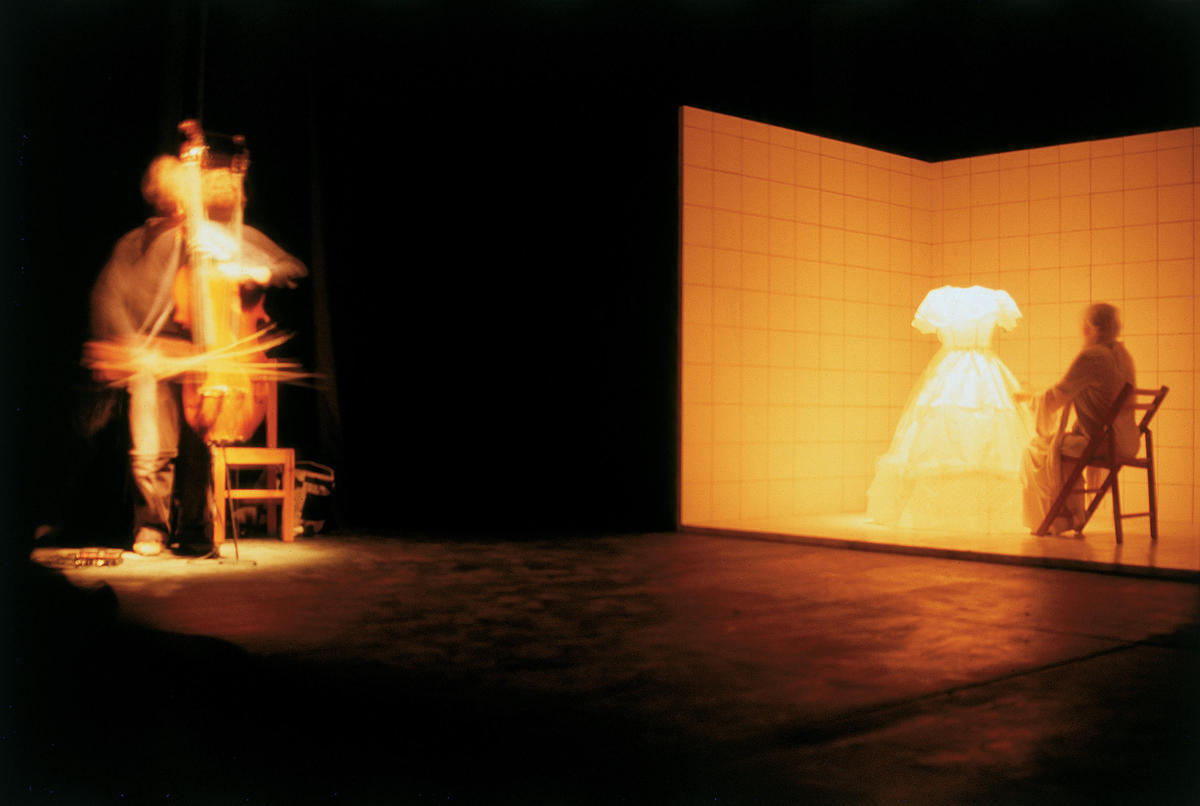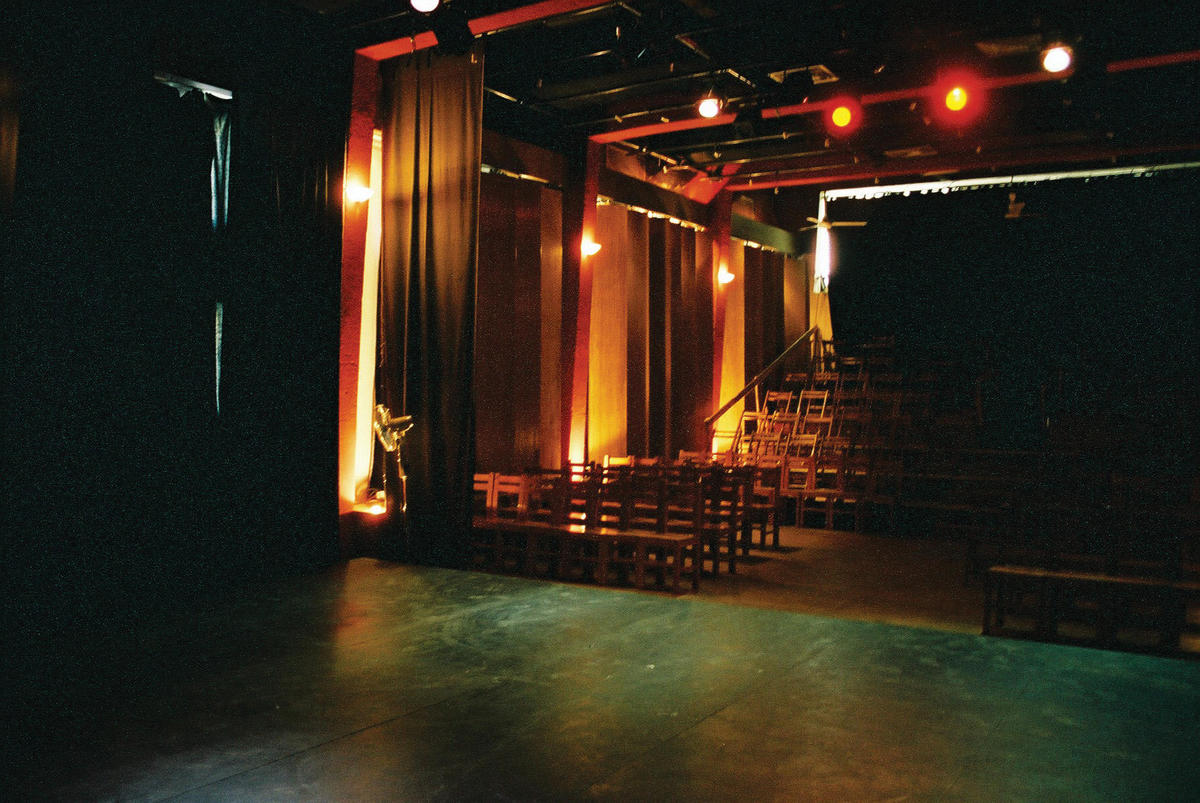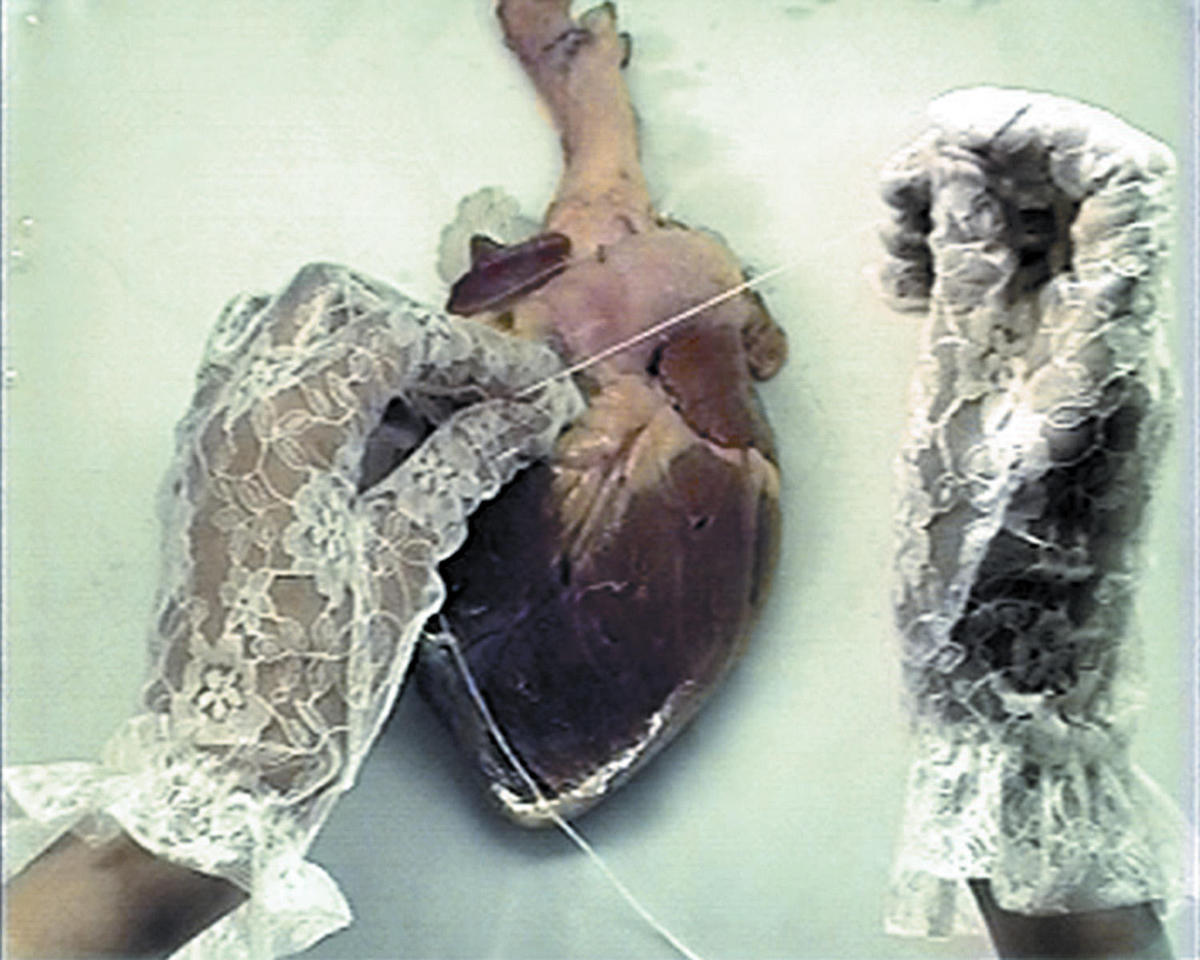
Tareq Abou el Fetouh is a hard person to get a hold of. If you’re lucky, you might find him in his office in Brussels or in Café Daringman, across the street from the Maison du Spectacle in the Rue de Flandre. But most of the time, he travels between projects, festivals and forums in Beirut, Alexandria, Amman, and Tunis. He is the producer and director of the Young Arab Theatre Fund (YATF), a scenic designer, an architect and a creator — but first and foremost, he is a discoverer. Discoverer of unused public areas, which he transforms into openly accessible theatre spaces.
Bidoun was lucky enough to meet the charismatic founder of the fund during the Kunsten Festival Des Arts in Brussels, where a production of the YATF was running. Between his coffee break and the start of a theatre performance, we spoke with the unassuming space designer about his beginnings, the development of the theatre landscape and his future projects.
The Young Arab Theatre Fund is an international association “designed to benefit young Arab artists.” Today, the staff of YATF consists of four people, who try to keep the inner strings of the fund untangled and oversee its operation. The fund offers financial backing, accompanies productions through to performance, and offers advice and support to the young dramaturges, actors and directors. However, one of the most successful programs remains the idea of transforming “misused” open spaces for independent artistic projects. These are not only happening in Egypt and Tunis, but in the near future, will also take place in Jordan and Lebanon. How did it all start?
Flashback.
Cairo. End of the ’90s. City centre. Cube-like festival tents, held aloft with 10x10 wooden stilts instead of ropes, offer areas for weddings, opera festivals and other forms of festivities — open spaces that change shape for a short period of time, thus creating a new location. With simple, precise construction, they can be quickly built and used flexibly. Already during his architectural studies, Tareq Abou el Fetouh was interested in these tent localities, and worked on the idea of transforming the cubic construction into a larger, connected spanned area. In this way, he helped the first mobile theatre space come into being. “I was fascinated by the idea that people transfer a public space into something new for a temporary time period,” say Fetouh, sitting across the table and playing with his cigarette packet. “And I followed that idea, looking for a way to make those tents suitable for performances.” He found a way: the largest tent construction contained an area of 23 x 15 meters. That was in 1999. And the start of an idea.

The practical sequel to this idea occurred in converting the garage of the Jesuit Cultural Centre in Alexandria, Egypt. In 2000, under the title It Is Happening in the Garage, the Jesuit Order’s garage was transformed into an alternative theatre space, becoming one of YATF’s first interdisciplinary art events in the process. The concept was a success. “Everything ran surprisingly well,” says Fetouh. “We were completely taken aback by the success. None of us had expected it. We thought that only the ‘usual suspects’ would come — those who spend their days in intellectual cafés and their evenings running from one performance to the latest opening.” Instead, young people in particular filled up the space. However, the opening of the theatre project Garage signalled not only the beginning of a series of space re-creations but also an attempt at practicing contextualization.
“Under the title ‘Cities Before the War,’ we organized a launch event, creating an interdisciplinary program with visual artists, architects, actors and filmmakers,” says Fetouh. “For example, we invited visual artists from Marseille and Alexandria to create installations on the subject. One of them was used as a stage set; the three others stood in the foyer. A few days before the theatre premiere, the visitors were already able to see and discuss the installations. In this way, we achieved a link between the architectural scene and the cinema and theatre scenes. The people who were interested in visual arts became interested for the first time in plays. When they saw the play and the film, they were able to get an idea about the background,” says Fetouh. Then, somewhat lost in his own thoughts and peering into his coffee cup, he adds, “Actually I do think that these kind of concepts should be taken on more and more, especially when we are presenting Arabic pieces in Europe.” All at once, he gathers up his thoughts and places the spoon next to his cup. Leaning forward, he continues: “But we discovered something else about those rehabilitated spaces after the Garage experience. They stimulate ideas. The idea of transforming. So that the space stands not only for distribution or presentation. They open up not only the walls in stones — but also those in the head, and show how spaces can be transformed and used for new ideas. They show that this is possible.”
The interdisciplinary idea has been carried into YATF’s latest program, the forum “Roaming Inner Landscapes.” Begun with a preparatory meeting in Tunis in January of this year and developed with performances, readings and discussions in Alexandria in February, Arab writers and dancers were given the opportunity to meet their African counterparts. Included in the program were Karim Mansour, Iman Smaoui, Joumana Mourad and Malak Sibai, just to name a few. During the discussions, what was most interesting was a certain confrontation on the “issue of the freedom of the body and dancing.” Most of the Arab artists pointed out that despite the new ways of restriction in society, Arabs are still an expressive people: “We wave our hands when we talk — not like them,” Fetouh says. “I stopped them at this point and asked who their counterpart in this comparison is. Silence. For the first time, they realized how much they are addicted to comparisons with European artists, due to the fact that 90 of them had been educated in Paris or London. They realized the diversity of existence and their own prejudices. That was one of the very strong moments,” he adds and crumples up the empty cigarette packet.

Like some other colleagues and organizations from the public art scene, Fetouh has set the highest priority in integrating local partners and communities. “I think it is very important to keep the independence of every space,” he says. “Each local partner has its own direction. So the townhouse gallery, for example, has a policy of open doors. Whatever theatre group arrives has the chance to perform there. This is a very good strategy, but the Garage, on the contrary, has a fixed program. They have to select which performances they want to put on. And there are so many factors that influence this choice — the city, the kind of audience they have been building throughout the years, and so on,” he adds pensively. “Of course, there are sometimes differences in opinion or developments in the locations that one had envisioned otherwise. But, by and large, this procedure has proved to be the right way. What’s more, we’ve secured our existence. We have a kind of deal with them. We got our productions in — for each space we have been given 29 nights a year, for three years. This deal gives us the guarantee that we can show young, unknown productions. The independence of the local partners therefore also means independence for us and prevents a situation in which we end up as a stiff institution with loads of permanent employees that no longer have reference points with the original basis. In this way, there is still enough energy to follow new developments and extension programs. Like the residency and touring plan. The latter is a kind of package program that tours all the spaces,” explains Fetouh.
With another cup of coffee shortly before the performance the relaxed attitude suddenly disappears. Fetouh runs back and forth between the theatre and café in ever-decreasing time periods. His expression turns subtly inwards. The number of cigarette puffs double. In such moments, the amount of energy and strain hidden in his work is obvious. Much later, after the end of the performance and after the small talk and the cheering, the Fetouh’s calmness and infectious laughter return once again.
“During the first year, we will have a pilot project for this with a small program of theatre, dance, visual arts and lectures. Next year, we will try to make it bigger,” he adds confidently. When asked how he can coordinate this extensive program, Fetouh only laughs and cleans his glasses. “How? Now there are four of us.”
YATF Young Arab Theatre Fund
19 Square Sainctelette
1000 Brussels, Belgium
Tel/fax : +32-2-203.12.95